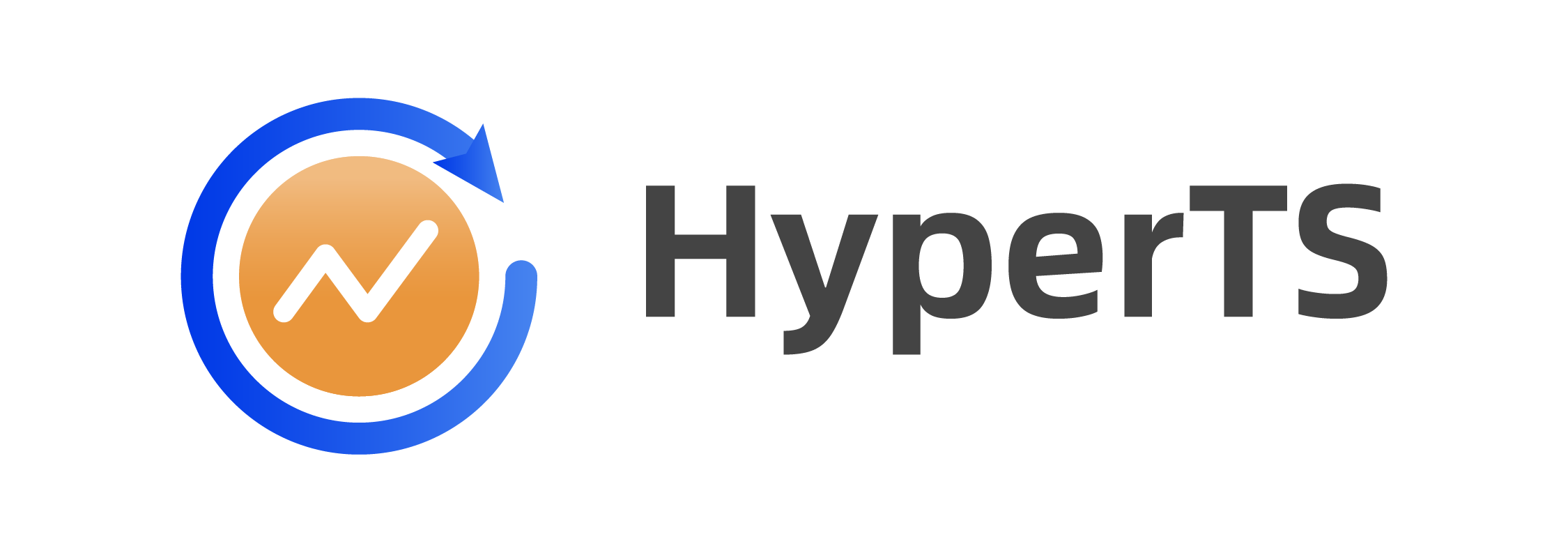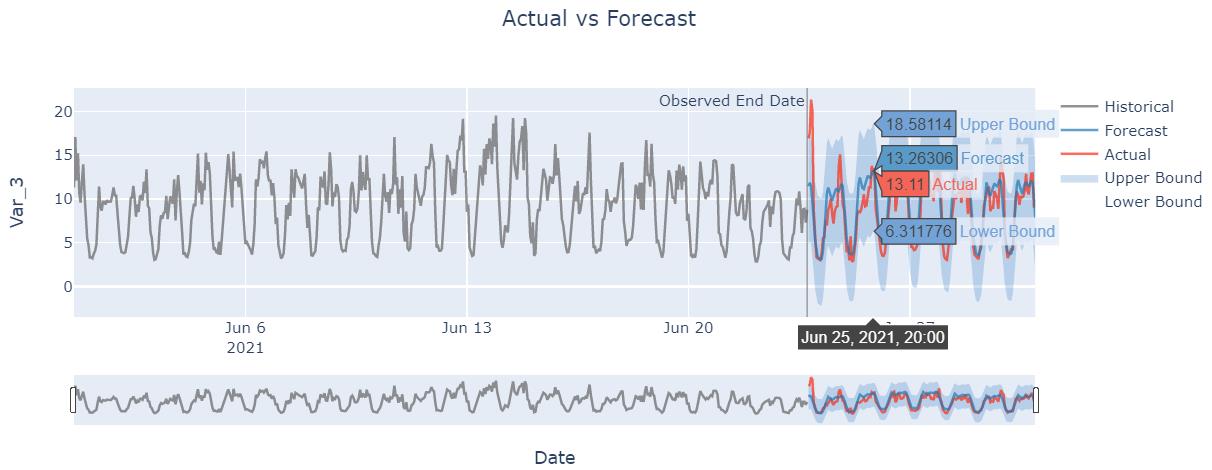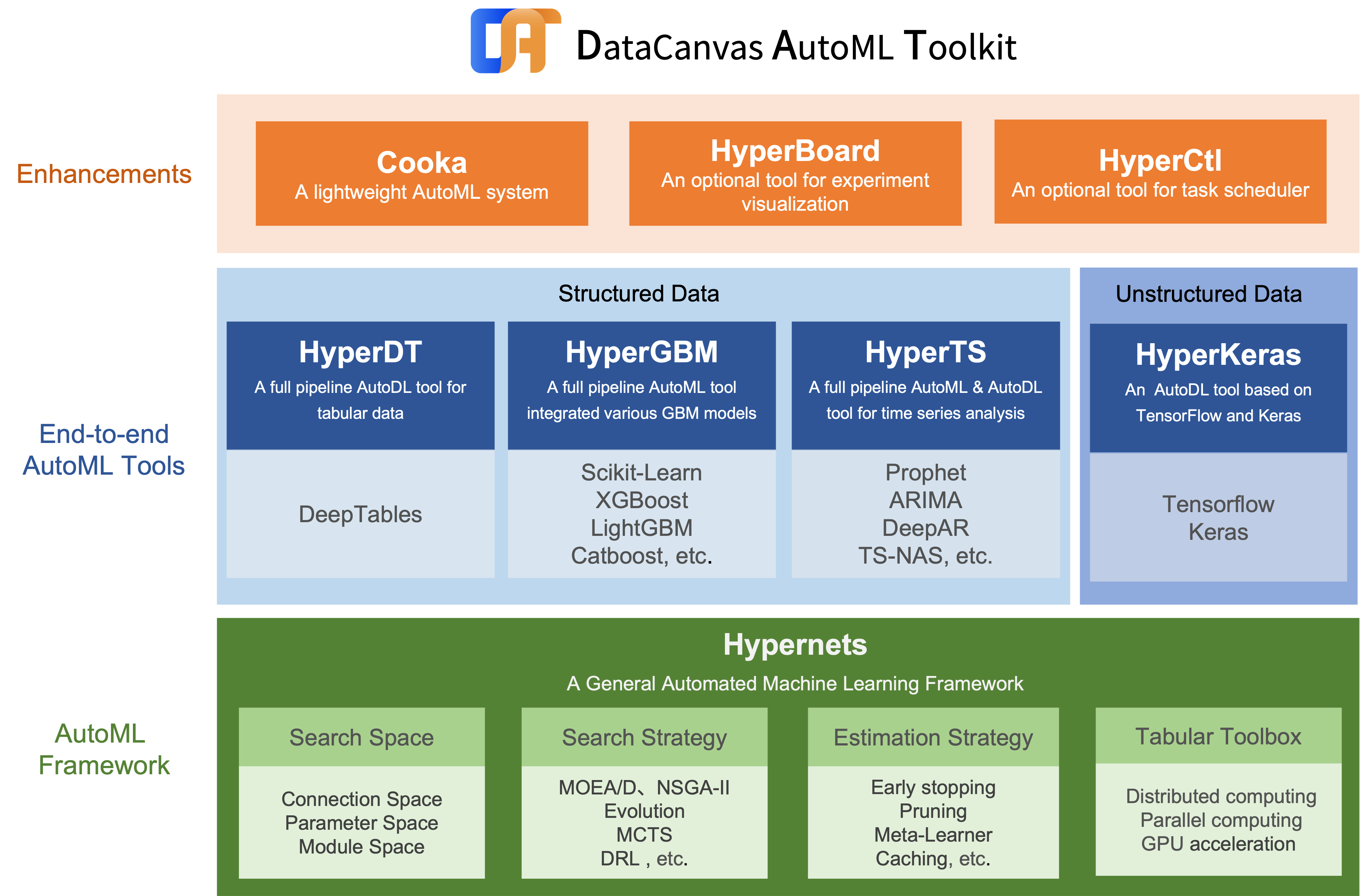No project description provided
Project description
Statistics | Deep Learning | Neural Architecture Search
:dizzy: Easy-to-use, powerful, and unified full pipeline automated time series toolkit. Supports forecasting, classification, regression, and anomaly detection.
We Are Hiring!
Dear folks, we are offering challenging opportunities located in Beijing for both professionals and students who are keen on AutoML/NAS. Come be a part of DataCanvas! Please send your CV to yangjian@zetyun.com. (Application deadline: TBD.)
Overview
HyperTS is a Python package that provides an end-to-end time series (TS) analysis toolkit. It covers complete and flexible AutoML workflows for TS, including data clearning, preprocessing, feature engineering, model selection, hyperparamter optimization, result evaluation, and visualization.
Multi-mode drive, light-heavy combination is the highlighted features of HyperTS. Therefore, statistical models (STATS), deep learning (DL), and neural architecture search (NAS) can be switched arbitrarily to get a powerful TS estimator.
As an easy-to-use and lower-threshold API, users can get a model after simply running the experiment, and then execute .predict(), .predict_proba(), .evalute(), .plot() for various time series analysis.
Installation
Note:
- Prophet is required by HyperTS, install it from
condabefore installing HyperTS usingpip. - Tensorflow is an optional dependency for HyperTS, install it if using DL and NAS mode.
HyperTS is available on Pypi and can be installed with pip:
pip install hyperts
You can also install HyperTS from conda via the conda-forge channel:
conda install -c conda-forge hyperts
If you would like the most up-to-date version, you can instead install direclty from github:
git clone git@github.com:DataCanvasIO/HyperTS.git
cd HyperTS
pip install -e .
pip install tensorflow #optional
For more installation tips, see installation.
Tutorial
| English Docs / Chinese Docs | Discription |
|---|---|
| Expected Data Format | What data formats do HyperTS expect? |
| Quick Start | How to get started quickly with HyperTS? |
| Advanced Ladder | How to realize the potential of HyperTS? |
| Custom Functions | How to customize the functions of HyperTS? |
Examples
Time Series Forecasting
Users can quickly create and run() an experiment with make_experiment(), where train_data, and task are required input parameters. In the following forecast example, we define the experiment as a multivariate-forecast task, and use the statistical model (stat mode) . Besides, the mandatory arguments timestamp and covariates (if have) should also be defined in the experiment.
from hyperts import make_experiment
from hyperts.datasets import load_network_traffic
from sklearn.model_selection import train_test_split
data = load_network_traffic()
train_data, test_data = train_test_split(data, test_size=0.2, shuffle=False)
model = make_experiment(train_data.copy(),
task='multivariate-forecast',
mode='stats',
timestamp='TimeStamp',
covariates=['HourSin', 'WeekCos', 'CBWD']).run()
X_test, y_test = model.split_X_y(test_data.copy())
y_pred = model.predict(X_test)
scores = model.evaluate(y_test, y_pred)
model.plot(forecast=y_pred, actual=test_data)
Time Series Classification (click to expand)
from hyperts import make_experiment
from hyperts.datasets import load_basic_motions
from sklearn.metrics import f1_score
from sklearn.model_selection import train_test_split
data = load_basic_motions()
train_data, test_data = train_test_split(data, test_size=0.2)
model = make_experiment(train_data.copy(),
task='classification',
mode='dl',
tf_gpu_usage_strategy=1,
reward_metric='accuracy',
max_trials=30,
early_stopping_rounds=10).run()
X_test, y_test = model.split_X_y(test_data.copy())
y_pred = model.predict(X_test)
y_proba = model.predict_proba(X_test)
scores = model.evaluate(y_test, y_pred, y_proba=y_proba, metrics=['accuracy', 'auc', f1_score])
print(scores)
Time Series Anomaly Detection (click to expand)
from hyperts import make_experiment
from hyperts.datasets import load_real_known_cause_dataset
from sklearn.model_selection import train_test_split
data = load_real_known_cause_dataset()
ground_truth = data.pop('anomaly')
detection_length = 15000
train_data, test_data = train_test_split(data, test_size=detection_length, shuffle=False)
model = make_experiment(train_data.copy(),
task='detection',
mode='stats',
reward_metric='f1',
max_trials=30,
early_stopping_rounds=10).run()
X_test, _ = model.split_X_y(test_data.copy())
y_test = ground_truth.iloc[-detection_length:]
y_pred = model.predict(X_test)
y_proba = model.predict_proba(X_test)
scores = model.evaluate(y_test, y_pred, y_proba=y_proba)
model.plot(y_pred, actual=test_data, history=train_data, interactive=False)
Time Series MetaFeatures Extract (click to expand)
from hyperts.toolbox import metafeatures_from_timeseries
from hyperts.datasets import load_random_univariate_forecast_dataset
data = load_random_univariate_forecast_dataset()
metafeatures = metafeatures_from_timeseries(x=data, timestamp='ds', scale_ts=True)
More detailed guides: EXAMPLES.
Key Features
HyperTS supports the following features:
Multi-task Support: Time series forecasting, classification, regression, and anomaly detection.
Multi-mode Support: A large collection of TS models, including statistical models (Prophet, ARIMA, VAR, iForest, etc.), deep learning models(DeepAR, GRU, LSTNet, NBeats, VAE, etc.), and neural architecture search.
Multi-variate Support: From univariate to multivariate time series.
Covariates Support: Deep learning models support covariates as input featues for time series forecasting.
Probabilistic Intervals Support: Time series forecasting visualization can show confidence intervals.
Diversified Preprocessing: Outlier clipping, missing value imputing, sequence smoothing, normalization, etc.
Abundant Metrics: A variety of performance metrics to evaluate results and guide models optimization, including MSE, SMAPE, Accuracy, F1-Score,etc.
Powerful Search Strategies: Adapting Grid Search, Monte Carlo Tree Search, Evolution Algorithm combined with a meta-learner to enable a powerful and effective TS pipeline.
Ensemble: Refinement greedy emsemble glues the most powerful models.
Cross Validation: Multiple time series cross-validation strategies ensure generalization ability.
Communication
- If you wish to contribute to this project, please refer to CONTRIBUTING.
- If you have any question or idea, you can alse participate with our Discussions Community.
HyperTS Related Projects
- Hypernets: A general automated machine learning (AutoML) framework.
- HyperGBM: A full pipeline AutoML tool integrated various GBM models.
- HyperDT/DeepTables: An AutoDL tool for tabular data.
- HyperKeras: An AutoDL tool for Neural Architecture Search and Hyperparameter Optimization on Tensorflow and Keras.
- HyperBoard: A visualization tool for Hypernets.
- Cooka: Lightweight interactive AutoML system.
Citation
If you use HyperTS in your research, please cite us as follows:
Xiaojing Zhang,Haifeng Wu,Jian Yang. HyperTS: A Full-Pipeline Automated Time Series Analysis Toolkit. https://github.com/DataCanvasIO/HyperTS. 2022. Version 0.2.x.
BibTex:
@misc{hyperts,
author={Xiaojing Zhang,Haifeng Wu,Jian Yang.},
title={{HyperTS}: { A Full-Pipeline Automated Time Series Analysis Toolkit}},
howpublished={https://github.com/DataCanvasIO/HyperTS},
note={Version 0.2.x},
year={2022}
}
DataCanvas
HyperTS is an open source project created by DataCanvas.
Project details
Release history Release notifications | RSS feed
Download files
Download the file for your platform. If you're not sure which to choose, learn more about installing packages.




















